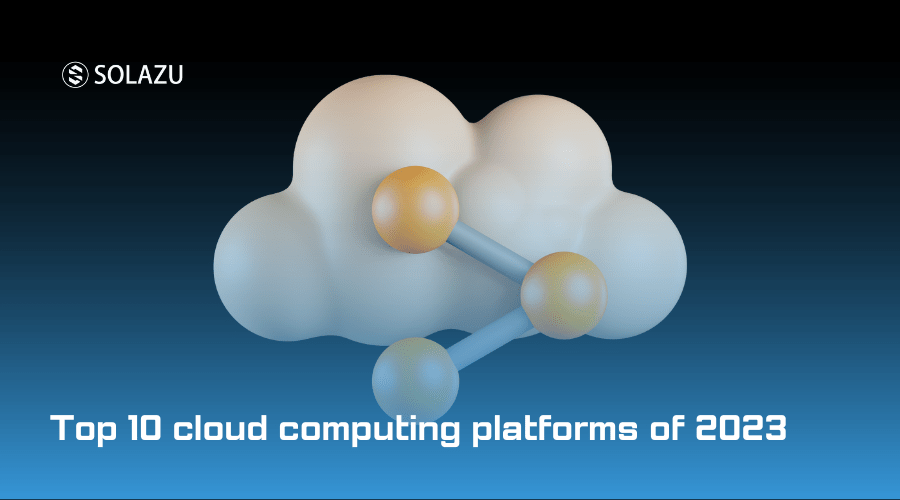Cloud computing has become an indispensable part of the tech world, offering businesses of all sizes the ability to store, manage, and process data remotely, with the added advantage of scalability, reliability, and cost efficiency. With the continuous growth of the cloud computing market, there are now a plethora of cloud computing platforms available to choose from, each with its unique features and capabilities. In this article, we will be looking at the top 10 cloud computing platforms of 2023.
1. Amazon Web Services (AWS)
Amazon Web Services (AWS) is a cloud computing platform offered by Amazon, providing scalable computing resources and services for building, deploying, and managing web applications. AWS offers an array of services, including storage, databases, networking, and security. AWS is the leading cloud computing platform, with a market share of 32%, and offers an extensive range of features and integrations, making it a top choice for businesses of all sizes.
2. Microsoft Azure
Microsoft Azure is a cloud computing platform provided by Microsoft, offering a range of services, including virtual machines, storage, analytics, and artificial intelligence. Azure is a robust and reliable platform, with a market share of 19%, and offers seamless integration with other Microsoft products and services, making it a popular choice for businesses that already use Microsoft technologies.
3. Google Cloud Platform
Google Cloud Platform (GCP) is a cloud computing platform offered by Google, providing services such as computing, storage, and machine learning. GCP offers a range of features and integrations, and its services can be used independently or combined with other Google products and services. GCP is a rapidly growing platform, with a market share of 8%.
4. IBM Cloud
IBM Cloud is a cloud computing platform provided by IBM, offering a range of services, including computing, storage, and artificial intelligence. IBM Cloud offers a range of features and integrations and is a reliable and secure platform, with a market share of 6%.
5. Alibaba Cloud
Alibaba Cloud is a cloud computing platform provided by Alibaba Group, offering a range of services, including computing, storage, and databases. Alibaba Cloud offers a range of features and integrations and is rapidly growing in popularity, with a market share of 5%.
6. Oracle Cloud
Oracle Cloud is a cloud computing platform provided by Oracle, offering services such as computing, storage, and databases. Oracle Cloud offers a range of features and integrations, and its services can be used independently or combined with other Oracle products and services. Oracle Cloud is a reliable and secure platform, with a market share of 4%.
7. DigitalOcean
DigitalOcean is a cloud computing platform that offers simple and affordable cloud computing solutions, making it an ideal choice for small and medium-sized businesses. DigitalOcean offers a range of features and integrations and is known for its ease of use and affordability.
8. Heroku
Heroku is a cloud computing platform that allows developers to build, deploy, and manage applications in the cloud. Heroku is known for its ease of use and offers a range of features and integrations, making it a popular choice for developers.
9. Rackspace
Rackspace is a cloud computing platform that provides a range of services, including computing, storage, and security. Rackspace offers a range of features and integrations and is known for its reliability and customer support.
10. Red Hat OpenShift
Red Hat OpenShift is a cloud computing platform provided by Red Hat, offering a range of services, including computing, storage, and networking. Red Hat OpenShift is known for its flexibility and reliability and offers a range of features and integrations.
In conclusion, cloud computing is an essential part of modern technology and businesses. Cloud computing platforms are becoming increasingly popular due to their ability to provide flexibility, scalability, and cost savings to businesses of all sizes. The top 10 cloud computing platforms of 2023 listed in this article are just a few of the many available options. Each platform has its own unique features and benefits, and businesses should carefully evaluate their specific needs and requirements before choosing a cloud computing provider.
It’s important to note that the cloud computing landscape is constantly evolving, with new technologies and providers emerging all the time. As such, businesses should regularly evaluate their cloud computing needs and stay up to date with the latest trends and developments in the industry.
Ultimately, choosing the right cloud computing platform can have a significant impact on a business’s success. By selecting a reliable and scalable platform that meets their specific needs, businesses can benefit from improved efficiency, agility, and cost savings, enabling them to better serve their customers and stay ahead of the competition.
